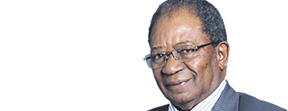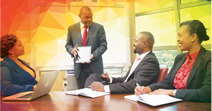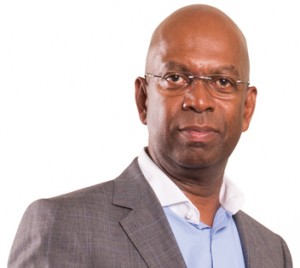2015 SUSTAINABILITY REPORT
Message from the CEO
‘Changing before we have to’
This report is being published at a challenging time from a sustainability perspective. As we become increasingly aware of the importance of operating in a sustainable manner, the dangers of blindly continuing with many current ‘business as usual’ resource consumption, management and leadership practices has been thrown into even sharper focus.
As a global community, the longer we delay making the required sustainability commitments and changes, the bigger the potential losses we face and the more radically our lives will be altered in the near future. It is also an exciting time from a sustainability perspective, nonetheless, as more environmentally aware approaches and technologies are starting to proliferate and gain prominence in boardroom discussions around the world. These stimulating developments, along with a growing appreciation of the need to address these challenges urgently, are serving as personal motivation to redouble my efforts to help spread this message, both within the company and the wider business ecosystem of which we form a part.
PRACTICING WHAT WE PREACH
We at Safaricom are committed to ‘practicing what we preach’ and so it seems fitting that my report back to you should start with an objective, critical assessment of where we are as an organisation from a sustainability perspective.
This year, we have done well in terms of our goal of raising awareness of sustainability within the business ecosystem, and I must commend my Leadership team, the Sustainability Champions and our business partners for their efforts in this regard. But has this been at the expense of internal attentiveness?
We continue to make good progress in terms of our environmental impact and energy efficiency, in particular, and I am pleased with our continued adoption of environmentally friendly, alternative energy solutions and technologies. We have calculated and published our carbon footprint for the fourth time this year and I am satisfied to note that our overall consumption is reducing, despite the continued growth of our network infrastructure, a clear reflection of our continued focus on energy efficiency.
That said, we have not embedded the personal understanding and values that drive sustainability throughout the business as much as I would have liked, and this needs to be an area to which we pay close attention in the coming year.
BEYOND COMPLIANCE
We need to remind ourselves that acting with integrity and honesty is as fundamental to ensuring our long-term
sustainability and shared prosperity as any new process or technology. We continue to have ‘zero tolerance’
for unethical or corrupt behaviour at any level of the company and have been bold and assertive when it comes to making difficult decisions.
It is not just about compliance in itself. We need to explain why unethical behaviour undermines our individual and collective futures. We need to get this message across so that it is understood.
I was very happy to participate in the Ethics Awareness Week we held here at Safaricom in August 2014 and share my views with staff candidly through a video message.
While it is gratifying to note that, according to the ethics perception survey conducted in January 2015, there has
been a perceived improvement in ethical standards and behaviour within the company, there is still much we can do to build ethical considerations into performance reviews and to reward exemplary ethical behaviour.
INTEGRITY ESSENTIAL FOR SHARED PROSPERITY
Ethical behaviour appears to be high on the agenda of the business community around us as well. As a member of the United Nations Global Compact (UNGC) Board and the UNGC Anti-Corruption Working Group, I was delighted to speak at the UNGC 10th Principle Anniversary event in New York in December 2014. The message from delegates there — and from the many other African business leaders with whom I have met during the year — is that, while degradation risks to the natural environment remain an extremely important challenge, corruption is an even more pressing issue. If I try to synthesise the feedback I have received during the year, it is that, whether we are talking about the natural environment or people of Africa, the single biggest obstacle to our long-term sustainability and shared prosperity is the corruption and unethical behaviour that results in the selfish exploitation of our people and resources for short-term gain.
It is part of the challenge the UNGC Africa Strategy team is tackling and another reason why we have relaunched
the initiative recently. We believe that we need to modernise and industrialise the continent without counter-productive exploitation. It’s a discussion that we need to have with some sense of urgency and one in which I would like to encourage our partners in both the public and private sectors to join us.
NO LONGER ‘BUSINESS AS USUAL’
These are challenging and exciting times for us as an organisation and for the continent as a whole. There
is much to be done and many enticing opportunities for those who embrace the commitments and changes
that need to be made. We are all going to have to change. ‘Business as usual’ is going to have to change.
Fortunately, sustainability provides us with a map to chart our course forward and the winners are likely to be
those individuals and companies that, to paraphrase the observation of Jack Welch, ‘change before they have to’.





















